PART III
In this section of our course, I will focus on the emergence and eventual demise of the Leninist Nation-state, one of the most dramatic stories of modern times. Here’s a point we can all agree upon: The communist regimes of the past century pursued policies horrific policies; millions of people died under Leninist rule. This is a fact. Still, if we want to make sense of this significant chunk of human history, we have to ask why these regimes lasted as long as they did. After all, for much of the twentieth century there were as many Leninist Nation-states in the world as Liberal Democratic states. Leninism represented the preeminent challenge to Liberal Democracy in the modern age.
Making sense of this historical period isn’t just a matter of appreciating a now-deceased idea of political organization. The legacy of Leninism helps us to understand the popularity and practices of leaders like Vladimir Putin and Kim Jong-un today. Even more important, this period provides essential clues to understanding the world today. Why do people fall prey to populist and autocratic perspectives in our part of the world? And what would it take to persuade them not to be bewitched by these perspectives? In other words, the past is present—and future.
I have written extensively on this issue. 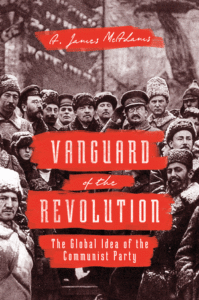 If you like, feel free to read my recent book, Vanguard of the Revolution. What the journal Foreign Affairs thinks: HERE
If you like, feel free to read my recent book, Vanguard of the Revolution. What the journal Foreign Affairs thinks: HERE
17. LECTURE: Monday, September 14
Reflections on Karl Marx’s Communist Manifesto and its significance for the history of world communism.
Today’s Question: Why did so many smart, well-educated people become Marxists? My argument is that Marxism shared many of the same foundations as Liberalism, even though it represented a radical critique of Liberal thought. It is essential to understand Marxism because it paved the way for a fundamentally different path to the Modern Nation-state.
In the contemporary world, it is equally important to ask why an intelligent person would support violent extremism, either on the Left or on the Right. The human problem just won’t go away.
Assignment: Read the Manifesto carefully–I suggest, at least three times. It is one of the greatest and most influential 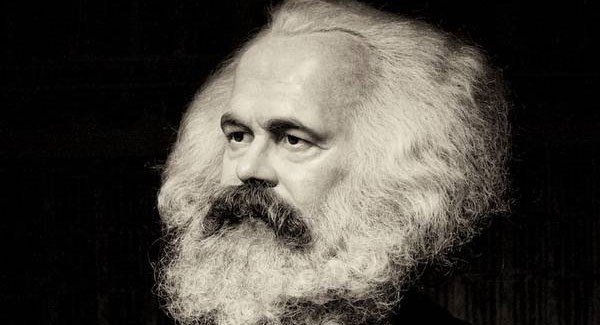 publications of all time. Look beyond the details for Marx’s overarching argument. What kind of argument is he making against capitalism? Why would it have been so appealing to many 19th and 20th century radicals? Indeed, why might it even appeal to contemporary populist politicians, especially Bernie Sanders and, yes, even Donald Trump. As you read the essay, pay close attention to what Marx says about the revolutionary character of the bourgeoisie.
publications of all time. Look beyond the details for Marx’s overarching argument. What kind of argument is he making against capitalism? Why would it have been so appealing to many 19th and 20th century radicals? Indeed, why might it even appeal to contemporary populist politicians, especially Bernie Sanders and, yes, even Donald Trump. As you read the essay, pay close attention to what Marx says about the revolutionary character of the bourgeoisie.
Karl Marx and Friedrich Engels, The Communist Manifesto, sections, 1, 2, and 4.
Read the following articles to get a sense for the environment in which Marx’s ideas thrived:
Friedrich Engels, “On the Condition of the Working Class in England” PRINT AND READ
M. Faraday, July 7, 1855, “The Filth of the Thames” PRINT AND TAKE NOTES
John McCain, “Salute to a Communist” READ
How could a Republican politician and and true American hero, like John McCain, find anything to admire about a communist? (In my personal view, McCain was an admirable human being. He thought for himself and epitomized the decency and compassion we should expect from any democratic leader).
18. LECTURE: Wednesday, September 16
Reflections on the causes of the Bolshevik revolution and its roots in the unintended consequences of imperial ambitions.
Today’s Assumption: Marx never expected that his proletarian revolution would take place in the East. In fact, he predicted it would not. So, how did the event happen? One must consider the setting of the Bolshevik revolution of October 1917 in order to understand why this context was better suited to mass upheaval than the western industrial world.
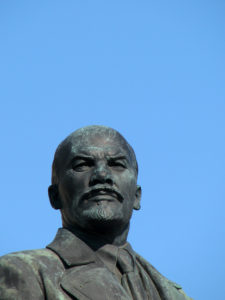
In considering the Bolshevik revolution, I also seek to address the issue of historical and political change. Since people use and overuse the word “revolution” all the time, I want you to think about how we should distinguish between truly “revolutionary” events, on the one hand, and events that are only highly significant, on the other. In my view, with which some observers would disagree, there haven’t been many revolutions in modern history. Indeed, I am not totally convinced that the American Revolution was a “revolution,” at least not socially or economically. Please feel free to disagree with me.
These two sources, one an article and the other, a video, are meant to provide you with a general background to the Bolshevik Revolution and its antecedents:
“Russian Revolution of 1917,” New World Encyclopedia READ
“The Russian Revolution,” DocumentaryTube.com (1:33.54) WATCH (Watch as much of this film as you can. It’s fascinating and full of terrific footage)
19. DISCUSSION SECTION: Friday, September 18
Discussion: The Communist Manifesto was once banned across the United States. Now you can read it and try to figure out what all the fuss was about. (Or was it simply dumb to ban it?) I am strongly opposed to the banning of books—see Fahrenheit 451 as well as Catcher in the Rye, Ulysses, Lady Chatterley’s Lover, etc. After all, why should we be afraid of words? Yet, the saga continues. Interestingly, Marx’s thinking was, in some ways, consonant with Liberal ideals. Yet, he came to radically different conclusions about how Liberalism’s idealistic principles could be realized. How can both of these claims be true? Keep in mind that Marxism, like woolly mammoths and alligators, and had to come from somewhere. In fact, it had the same historical roots as Liberalism.
Assignment: How might the essential aspects of Marx’s critique of capitalism appeal to contemporary populist politicians, especially Bernie Sanders and, yes, even Donald Trump (but not to non-populist traditional politicians like Joe Biden and Mitt Romney)?
20. LECTURE: Monday, September 21
Reflections on Vladimir Ilyich Lenin’s transformation of elementary Marxism into a new political identity: Leninism (originally known as Bolshevism).
Today’s Assumption: Leninism had more to do with defining Marxism than the other way around. Lenin was a mediocre philosopher but a great revolutionary. He knew instinctively how to apply a western recipe for radical change to a backward country. For this reason, one could argue that “Marx was archaeopteryx and Lenin was his bird.” See HERE
Assignment: The best way to understand the fully tragic implications of Leninism is to see how it was implemented at the height of the Soviet revolution under Josef Stalin. To this end, I am asking you to read the Man himself.
Selections from Josef Stalin, Foundations of Leninism. PRINT AND READ Section 4 (“Dictatorship of the Proletariat”) and Section 8 (“The Party”) Get a general sense for Stalin’s argument; don’t worry about the details.
The rousing anthem, “The International,” became the hymn for communist and other radical working-class movements throughout the world.
Watch Pete Seeger sing the The Internationale. I sang it to my tour guides when I was in Pyongyang, North Korea and it drove them crazy. How could they prevent me from paying tribute to one of their ideological forebears! Yet the entire time I was in North Korea, I only saw one picture of Marx and Lenin.
More versions of the International:
The classic Soviet version WATCH
Also, from the movie ‘Reds’ starring Warren Beatty and Diane Keaton: WATCH
Also, Chinese pop version WATCH
Also, Bill Murray’s puppet sings: WATCH
Also, Rage Against the Machine: WATCH
Also, listen to “Occupy Wall Street” protesters sing the Internationale WATCH (I’m not sure that many actually knew the words, but it’s interesting that they sang it)
21. LECTURE: Wednesday, September 23
Reflections on the transmogrification of Marxist and Leninist utopia into Stalinist terror.
Today’s Assumption: Stalin’s regime of terror was intrinsically, if not inevitably, rooted in the goals and institutions of Leninism. Leninism also degenerated into horrific violence in other countries, especially China. Alas, in this course we don’t have enough time to cover the varied expressions of this degeneration outside of the Soviet Union. However, if you are interested, you can see my account of these experiences in my latest book, Vanguard of the Revolution.
“Purges and Hysteria in the Soviet Union”: READ (all six pages)
Ode to Stalin: READ
22. DISCUSSION SECTION: Friday, September 25
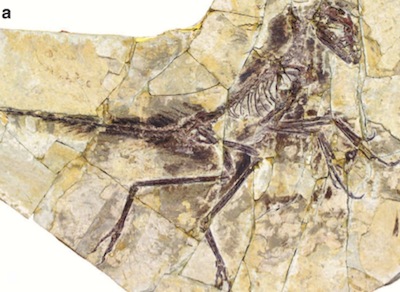
Paragraph assignment: “If Marx was an archaeopteryx , would that make Lenin his bird?”
Discussion: You have been assigned to start a revolution–a real one!–at Notre Dame. Based upon your reading of the the Communist Manifesto and the chapters from Stalin’s Foundations of Leninism, please exuberantly and passionately discuss the following two questions: 1) what would Lenin (and Stalin) advise you to do to foment this revolution? and 2) what challenges would you face in fomenting this revolution and then keeping it going?
To put the question more generally: Are all true revolutions inevitably destined to spiral into violence?
23. LECTURE: Monday, September 28
Reflections on the Leninist challenge to Liberal Democracy.
Today’s Assumption: Leninism was initially a credible challenge to Liberal Democracy. Its lasting appeal was reinforced by a variety of factors. In the 1980s, I had the rather unusual experience of living in East Germany. I’ll attempt to give you a sense for these factors by sharing some of my experiences in the years before the fall of the Berlin Wall. To live in the Soviet bloc at that time was very different–and, its own way, more “normal”–than under Stalin’s totalitarian regime. I’ll explain how and why.
For this week, we have two major assignments.
First, please watch the one-hour documentary “Journey to Russia” on our Course Reserves site. It is a fantastic depiction of life as people actually lived it in the Soviet Union in the early 1980s:
“Journey to Russia” WATCH
Second: In the 1980s, all of the experts, including yours truly, were skeptical about the idea that people living under communism could rise up spontaneously against their leaders. Yet in the late 1970s, dissidents like the physicist Andrei Sakharov and the playwright Vaclav Havel, 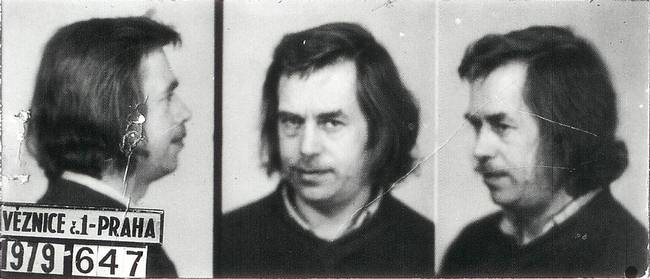 were already providing the ideas about why such events might occur.
were already providing the ideas about why such events might occur.
NOTE: Havel’s essay is not only about life in Czechoslovakia. It is about the difference between “living within a lie” and “living within the truth” in any society, including the US. This is a big theme in Fahrenheit 451. The dispute over the meaning of “truth” and its implications for our behavior is also central to the crisis of American democracy today.
At this stage of our discussion, let’s ask why McAdams and other experts underestimated the power of Havel’s account.
Václav Havel, “Power of the Powerless,” in Open Letters: Selected Writings, 1965-1990, sections I-VI.
The “Power of the Powerless” is challenging reading. I am honored that you will take up this challenge.
Read this brief article on the Czechoslovakia’s Charter 77 movement (HERE) for background, as well as this short article on Havel’s life
24. LECTURE: Wednesday, September 30
Reflections on the sudden and total collapse of the Leninist Nation-State.
Today’s Assumption: No one predicted this explosive development (in the serious sense of the word “prediction”). By the same token, Leninism was not destined to collapse when it did.
Assignment: Reflect upon Mikhail Gorbachev’s role in the fall of the Leninist Nation-State
Learn about Gorbachev’s concept of Leninist reform READ
Based upon what you have seen, could Leninism have been reformed in the way Gorbachev hoped? How compatible were Gorbachev’s two primary reform concepts (below) with the Leninist political identity?
Gorbachev’s concept of Perestroika READ
Gorbachev’s concept of Glasnost READ
Implications: What lessons can we learn from the communist experience about the collapse of dictatorships in general? Is it enough to present people with the facts about a dictatorship’s failings to make them want to risk rebellion? Why do some people refuse to accept facts even in liberal democracies?
25. DISCUSSION SECTION: Friday, October 2
Topic:
Discuss the first half of “Power of the Powerless.” Why is the green grocer so important to Havel’s argument? Would you have acted differently than the green grocer if you had lived in a Leninist state? What kinds of events would be required to convince the green grocer that he should rebel? What types of circumstances would persuade you, too, to rebel?
Paragraph Assignment: To what extent, if at all, do we “live within a lie” in the United States”? Consider this study about the choice between truth-telling and happiness while you write your response: HERE
26. LECTURE: Monday, October 5
Reflections on the fuzzy transition to post-communism in the 1990s and then the advance of populist hysteria in the 2010s.
Today’s Assumption: The big surprise was not only that Leninism fell between 1989 and 1991. In many cases, it was also surprising that post-communist state gradually progressed to something resembling Liberal Democracy. Yet despite all the promise of this period, the populations of many of these states now face a sobering question: Will viable democracy survive in any meaningful sense?
Peculiar signs of life after communist dictatorship!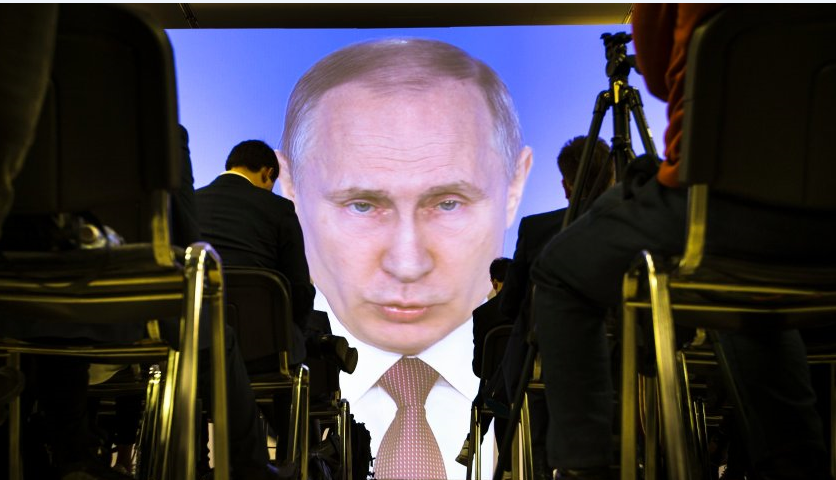
Gorbachev sings LISTEN
Vladimir Putin plays piano and sings WATCH
Assignments:
For your discussion section on Friday, finish reading Václav Havel, “Power of the Powerless,” in Open Letters: Selected Writings, 1965-1990.
What is new and what has changed after the revolutions of 1989-1991?
Vladimir Tismaneanu, “The Legacies of 1989: The Moving Ruins” Journal of Democracy, January 2014 See JSTOR at Hesburgh Library e-Journals PRINT AND READ
Jaroslaw Kuisz and Karolina Wigura, Foreign Policy, May 13, 2020, “Why populists understand eastern Europe better than liberals,” READ
Reflect: Why would Stalin still be popular in Russia? WATCH this video from Al Jazeera, and consider Nadia Beard, “Stalin Rises Again” READ
Julia Ioffe, “Why many young Russians see a hero in Putin” READ
Jarosław Kuisz and Karolina Wigura, “The Pushback Against Populism Reclaiming the Politics of Emotion,” Journal of Democracy, April 2020 at Hesburgh, through Project Muse PRINT AND READ
This article has some good ideas about how the defenders of liberal democracy should combat populism; I’ll return to them later in the semester.
Once you have read these articles, reflect upon alternative models for this transition: mass extinction or archaeopteryx. What would the adoption of one or the other image tell you about the nature of political change.
